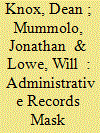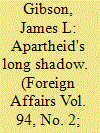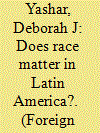|
|
|
Sort Order |
|
|
|
Items / Page
|
|
|
|
|
|
|
| Srl | Item |
| 1 |
ID:
174450


|
|
|
|
|
| Summary/Abstract |
Researchers often lack the necessary data to credibly estimate racial discrimination in policing. In particular, police administrative records lack information on civilians police observe but do not investigate. In this article, we show that if police racially discriminate when choosing whom to investigate, analyses using administrative records to estimate racial discrimination in police behavior are statistically biased, and many quantities of interest are unidentified—even among investigated individuals—absent strong and untestable assumptions. Using principal stratification in a causal mediation framework, we derive the exact form of the statistical bias that results from traditional estimation. We develop a bias-correction procedure and nonparametric sharp bounds for race effects, replicate published findings, and show the traditional estimator can severely underestimate levels of racially biased policing or mask discrimination entirely. We conclude by outlining a general and feasible design for future studies that is robust to this inferential snare.
|
|
|
|
|
|
|
|
|
|
|
|
|
|
|
|
| 2 |
ID:
137570


|
|
|
|
|
| Summary/Abstract |
Last April, South Africa celebrated the 20th anniversary of its first democratic elections, which brought to power the African National Congress (ANC) and its leader, Nelson Mandela, who had led the antiapartheid movement for decades. Many had long believed that civil war was the only way that the apartheid state would fall, and South Africa’s mostly peaceful transition from a racist authoritarian state to a multiracial democracy stands as one of the most surprising political developments of the twentieth century. The shift has not been without its problems, but few would contest South Africa’s credentials as a democracy—perhaps the most democratic state in Africa.
|
|
|
|
|
|
|
|
|
|
|
|
|
|
|
|
| 3 |
ID:
137568


|
|
|
|
|
| Summary/Abstract |
In 1992, the Nobel Committee awarded its Peace Prize to Rigoberta Menchú Tum, the daughter of poor Guatemalan peasants, for her work promoting indigenous rights. Her prize, momentous in its own right, highlighted a sea change in Latin American politics. Throughout the 1980s and early 1990s, prominent indigenous movements had emerged in countries such as Bolivia, Ecuador, Guatemala, and Mexico. As a result, Latin American countries undertook unprecedented reforms to address ethnic diversity: politicians amended national constitutions to recognize indigenous people, passed laws supporting bicultural education and affirmative action, and added questions about race and ethnicity to official censuses.
|
|
|
|
|
|
|
|
|
|
|
|
|
|
|
|
|
|
|
|
|